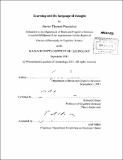Learning and the language of thought
Author(s)
Piantadosi, Steven Thomas
DownloadFull printable version (18.12Mb)
Other Contributors
Massachusetts Institute of Technology. Dept. of Brain and Cognitive Sciences.
Advisor
Edward Gibson.
Terms of use
Metadata
Show full item recordAbstract
This thesis develops the hypothesis that key aspects of learning and development can be understood as rational statistical inferences over a compositionally structured representation system, a language of thought (LOT) (Fodor, 1975). In this setup, learners have access to a set of primitive functions and learning consists of composing these functions in order to created structured representations of complex concepts. We present an inductive statistical model over these representations that formalizes an optimal Bayesian trade-off between representational complexity and fit to the observed data. This approach is first applied to the case of number-word acquisition, for which statistical learning with a LOT can explain key developmental patterns and resolve philosophically troublesome aspects of previous developmental theories. Second, we show how these same formal tools can be applied to children's acquisition of quantifiers. The model explains how children may achieve adult competence with quantifiers' literal meanings and presuppositions, and predicts several of the most-studied errors children make while learning these words. Finally, we model adult patterns of generalization in a massive concept-learning experiment. These results provide evidence for LOT models over other approaches and provide quantitative evaluation of different particular LOTs.
Description
Thesis (Ph. D.)--Massachusetts Institute of Technology, Dept. of Brain and Cognitive Sciences, 2011. Cataloged from PDF version of thesis. Includes bibliographical references (p. 179-191).
Date issued
2011Department
Massachusetts Institute of Technology. Department of Brain and Cognitive SciencesPublisher
Massachusetts Institute of Technology
Keywords
Brain and Cognitive Sciences.